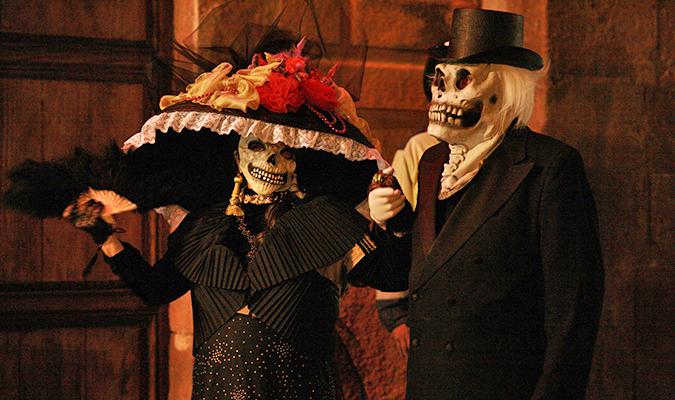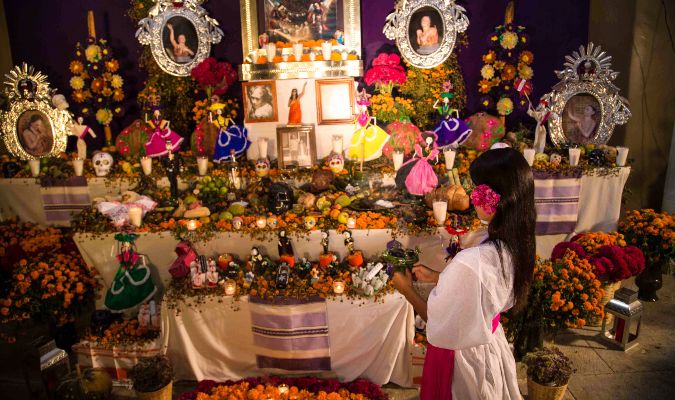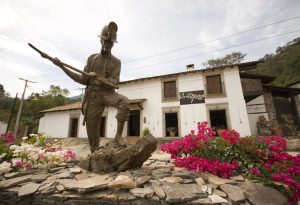Mexican celebrations and national holidays offer the out-of-town visitor a fantastic chance to witness the country at its most raw. The fiestas and celebrations can be loud, raucous, and colorful but also deeply religious, poignant, and touching.
If you’re thinking about booking a vacation to Mexico, then take a look at what annual celebration you might be able to experience while you’re in the country.
Annual Mexican celebrations
January
New Year’s Day (Año Nuevo)
When: January 1
About: Along with much of the rest of the world, Mexico celebrates New Year’s Day on January 1. It’s traditional for families to come together on this day for some food and to share some stories from the night before. New Year’s Day is a day off for many workers, so don’t be surprised if it seems a little busier than usual.
Epiphany (Dia de los Reyes Magos)
When: January 6
About: Marking the beginning of the end of the Christmas celebrations, Epiphany sees many Mexicans eat rosca de reyes (king’s cake). This oval-shaped treat is meant to represent the Three Kings in the form of a crown and it might have a little figurine inside which symbolizes Jesus. They say the person who finds the Jesus in their slice should hold a fiesta on Día de la Candelaria.
February
Candlemass (Día de la Candelaria)
When: February 2
About: A deeply religious day, Candlemass sees loved ones come together in Mexico to share a meal of tomales. More religious families may also dress a baby Jesus and take it to their church.
Constitution Day (Día de la Constitución)
When: First Monday in February
About: A day off for Mexican workers, Día de la Constitución marks the day in 1917 when the country’s constitution came into law. You’re likely to see celebrations across the country, including picnics, parties, family gatherings, and festivals.
Valentine’s Day (Día del Amor y la Armistad)
When: February 14
About: Valentine’s Day in Mexico is celebrated in much the same way as it is elsewhere: chocolates, roses, dates, soppy messages, and romance. However, in Mexico, there is more focus paid on the love between friends so you wouldn’t be out of place sending a little message to your buddies.
Mexican Army Day (Día del Ejército)
When: February 19
About: Mexican Army Day honors two significant events in Mexico’s history: the creation of the Mexican Army in 1913 and the Loyalty March of 1911, when Cadets of the Military College led the president, Francisco Madero, to the National Palace. Mexican Army Day is your chance to see military parades, flag raising ceremonies, and tributes to the fallen.
Flag Day (Día de la Bandera)
When: February 24
About: Dia de la Bandera is a day of patriotism where you will likely see many, many Mexican flags hung across the country. You may also see a parade or two in which the crowds will salute the flag as it passes.
March
Anniversary of the Oil Expropriation (Aniversario de la Expropiación petrolera)
When: March 18
About: Aniversario de la Expropiación petrolera celebrates the day that former Mexican president Lázaro Cárdenas signed an order that took control of the majority of the foreign oil companies working in Mexico.
Benito Juarez’s Birthday (Natalicio de Benito Juárez)
When: Third Monday of March
About: A public holiday in Mexico, the third Monday of March marks the birthday of Benito Juarez, a celebrated politician and democracy advocate. Indigenous Zapotec, Juarez, went on to become the 26th president of Mexico and brought about several political and social changes. Many Mexicans will take advantage of the long weekend to take a trip and spend time with their families.
Extra: Semana Santa and Pascua
When: The week before Easter week
About: One of the most important festivals in the Mexican calendar, Mexico’s Easter-time celebrations are divided into two very special weeks: Semana Santa and Pascua. Businesses and schools often close during this religious period, while families will take the chance to have a vacation together.
Semana Santa celebrations include parades, ceremonies, rituals, and dramatic reenactments while some towns have their own unique way of celebrating it.
Pascua is a calmer week when Mexican families tend to take their vacations.
Read more: For the full insight into the Easter-time celebrations, check out our in-depth blog post on Semana Santa and Pascua
April
Heroic Defense of Veracruz (Heroica Defensa de Veracruz)
When: April 21
About: This civic holiday celebrates the cadets and navy personnel from the Heroica Escuela Naval Militar and Mexican Navy who attempted to defend the city of Veracruz after it was occupied by the United States in 1914.
Children’s Day (Día del Niño)
When: April 30
About: On Children’s Day, parents might buy presents for their little ones while schools will throw mini celebrations for their pupils. Children enjoy games, eat candies, and generally have fun.
May
Labor Day (Día del Trabajo)
When: May 1
About: A day to celebrate the Mexican workforce, Dia del Trabajo is a national holiday across the country. As with many other national days of rest, the local population will use this time to spend with their friends and family.
Fifth of May (Cinco de Mayo)
When: May 5
About: Often confused with Mexican Independence Day by the rest of the world, Cinco de Mayo actually marks the Mexican victory over the French at the Battle of Puebla. While the Cinco de Mayo celebrations are big in the United States of America, the largest celebrations in Mexico are typically focused in Puebla, where the actual battle took place. Here you will find a great celebration, replete with parades, battle reenactments and more.
Miguel Hidalgo’s Birthday (Natalicio de Miguel Hidalgo)
When: May 8
About: May 8 marks the birthday of Miguel Hidalgo, one of the leaders of the Mexican revolution nicknamed The Father of Mexican Independence.
Mothers’ Day (Día de las Madres)
When: May 10
About: As you might expect, Mothers’ Day in Mexico celebrates the moms. Children normally show their thanks and love through gifts of flowers and chocolates. Many Mexican families will also come together for a big meal, often with traditional dishes.
Teachers’ Day (Día del Maestro)
When: May 15
About: Teachers’ Day has been celebrated in Mexico since 1918. On May 15, schools will either close completely or hold a day of fun activities for the kids and teachers. Youngsters may also bring in presents for their teachers as a way of thanking them for their hard work.
Students’ Day (Día del Estudiante)
When: May 23
About: Students’ Day in Mexico is a chance for the population to celebrate the freedom to be educated.
June
National Maritime Day (Día de la Marina)
When: June 1
About: A celebration of the Mexican Navy and the civil maritime sectors, National Maritime Day is marked with the flying of flags at government buildings. It’s particularly popular, unsurprisingly, in the coastal regions, where you might find parades, fireworks, and dances.
Fathers’ Day (Día del Padre)
When: Third Sunday of June
About: Fathers’ Day is a celebration of all the dads in Mexico. Typically, families will come together to share a meal while fathers might receive a gift or two from their children.
July and August
There are no major Mexican celebrations in July or August.
September
Anniversary of the Boy Heroes (Dia de los Niño’s Héroes)
When: September 13
About: Dia de los Niño’s Héroes pays tribute to six teenage cadets who died, bravely defending Mexico City’s Chapultepec Castle against the United States Army. It’s said that the last boy alive, Juan Escuti, jumped from the building draped in the Mexican flag rather than give it to the US troops.
Cry of Dolores (El Grito de Dolores)
When: September 15
About: More the beginning of Independence Day than a holiday in its own right, El Grito honors the moment independence leader Miguel Hidalgo rang his church bell and called the Mexican people to rise against the Colonial occupation. Now, the Mexican president will lead El Grito de Dolores from the balcony of the National Palace in Mexico City. Sometimes, however, the shout may take place in the Dolores Hidalgo, where the original call to arms was made. If you head to other Mexican cities and towns, you may hear local government officials reenacting their own El Grito.
Read more: The Story of El Grito and Mexico’s Independence Day
Independence Day (Día de la Independencia)
When: September 16
About: After El Grito the night before, Independence Day in Mexico is marked in a spectacular celebration of sound, light, and color. Expect street parties, fireworks, flowers, and lots of flags across the country.
Read more: Independence Day in Mexico: The Tale Behind the Fight for Freedom
Morelos’ Birthday (Natalicio de José Ma. Morelos y Pavón)
When: September 30
About: The birth of Jose Maria Morelos y Pavon, another independence leader, is celebrated on September 30, particularly in Morelia which has taken his name. Here you will find street stalls, food, local shows, and more. School children will form a parade down the main streets accompanied by drums and bugles.
October
The Day of the Race (Día de la Raza)
When: October 12
About: The Day of the Race, an alternative to Columbus Day, celebrates the indigenous people of Mexico. In some parts of Mexico, native communities come together in their traditional clothing to celebrate the day.
November
Day of the Dead (Dia de Muertos)
When: November 1 to 2
About: The main Day of the Dead celebrations take place on November 2. On this day, families pay tribute to their lost loved ones by visiting the cemeteries where they are buried and leaving them flowers, their favorite food, and tributes. Throughout the day, Mexican families will also come together to eat food and drink. You may also see special parades with floats and people in highly elaborate costumes.
November 1 is known as Dia de los Angelitos (Day of the Little Angels) and pays tribute to children and infants who have died.
Read more: Day of the Dead in Mexico Explained

Revolution Day (Día de la Revolución)
When: November 20
About: Revolution Day honors the start of the Mexican Revolution. Cities will throw their own celebrations with parades and ceremonies taking place.
Mexican Navy Day (Dia de la Armada de Mexico)
When: November 23
About: Not to be confused with National Maritime Day, Mexican Navy Day celebrates the country’s navy with a series of parades and ceremonies. Head to the coastal towns for the best celebrations.
December
Day of the Virgin Guadalupe (Día de la Virgen de Guadalupe)
When: December 12
About: Dia de la Virgen de Guadalupe marks the day when a man named Juan Diego met the Virgin Mary in Mexico City in 1531. It’s said that Mary instructed Juan Diego to arrange for a church to be built on Tepeyac Hill. Now, celebrations take place across Mexico to honor this miracle, while the followers of Catholicism will attend church.
Las Posadas
When: December 16 to 24
About: A Christmas tradition, posadas are a reenactment of Joseph and Mary’s quest to find a place to stay before the birth of Jesus. Traditional songs are sung, piñatas are struck, and food and drink are consumed. To truly experience a traditional Mexican Christmas, you can’t miss out on a posada.
Itinerary: Book our Winter Holiday in Colonial Mexico vacation to experience a true Mexican Christmas
Christmas Eve (Nochebuena)
When: December 24
About: Christmas Eve in Mexico (called Nochebuena) will mark the end of the posadas, while children receive gifts from baby Jesus. It’s normal for families to come together and enjoy a traditional Mexican Christmas meal while Christians may also go to church for a Midnight Mass called Misa de Gallo.
Christmas Day (Navidad)
When: December 25
About: The largest Christmas celebrations take place on December 24 in Mexico, soChristmas Day is a family day, where workers get time off to catch up with their loved ones and eat leftovers from the night before.
Day of the Innocents (Dia de los Santos Inocentes)
When: December 28
About: Day of the Innocents, which can be likened to April Fools’ Day, is a day for pranks and tricks. It actually commemorates the tale of King Herod ordering all baby boys to be executed in a bid to kill baby Jesus.
New Year’s Eve (Víspera de Año Nuevo)
When: December 31
About: In Mexico, the new year is welcomed with a flash of bang and color. Fireworks take place across the country including in the capital of Mexico City with plenty of fiestas and street parties taking place. If you come at this time, you may also pay witness (or even take part) in the eating of 12 grapes at midnight. It’s said that if you manage to finish your dozen grapes in less than 60 seconds, you will get 12 wishes come true.
Public holidays in Mexico
Public holidays in Mexico mean workers can take the day off and relax with their friends and family. Here are the public holidays for 2024.
Public holidays in Mexico 2024
| New Year’s Day | January 1 |
| Constitution Day | February 5 |
| Benito Juarez’s Birth | March 21 |
| Good Friday | March 29 |
| Labor Day | May 1 |
| Election Day | June 02 |
| Mexican Independence Day | September 16 |
| Presidency Transition Day | October 1 |
| Revolution Day | November 20 |
| Christmas Day | December 25 |
Start Planning to Experience a Mexican festival in Mexico
To witness or take part in a Mexican festival is a once-in-a-lifetime experience that can be both joyous and humbling at the same time. However, logistically, it can be difficult to organize with luxury hotels and villas snapped up quickly. Make sure to speak to a Journey Mexico Travel Planner who can organize your whole trip for you taking in the very best celebrations throughout the country. Our custom-tailored journeys start from $1,000 USD per day for two travelers in interior Mexico, and $1,800 per day for two travelers in beach destinations.





